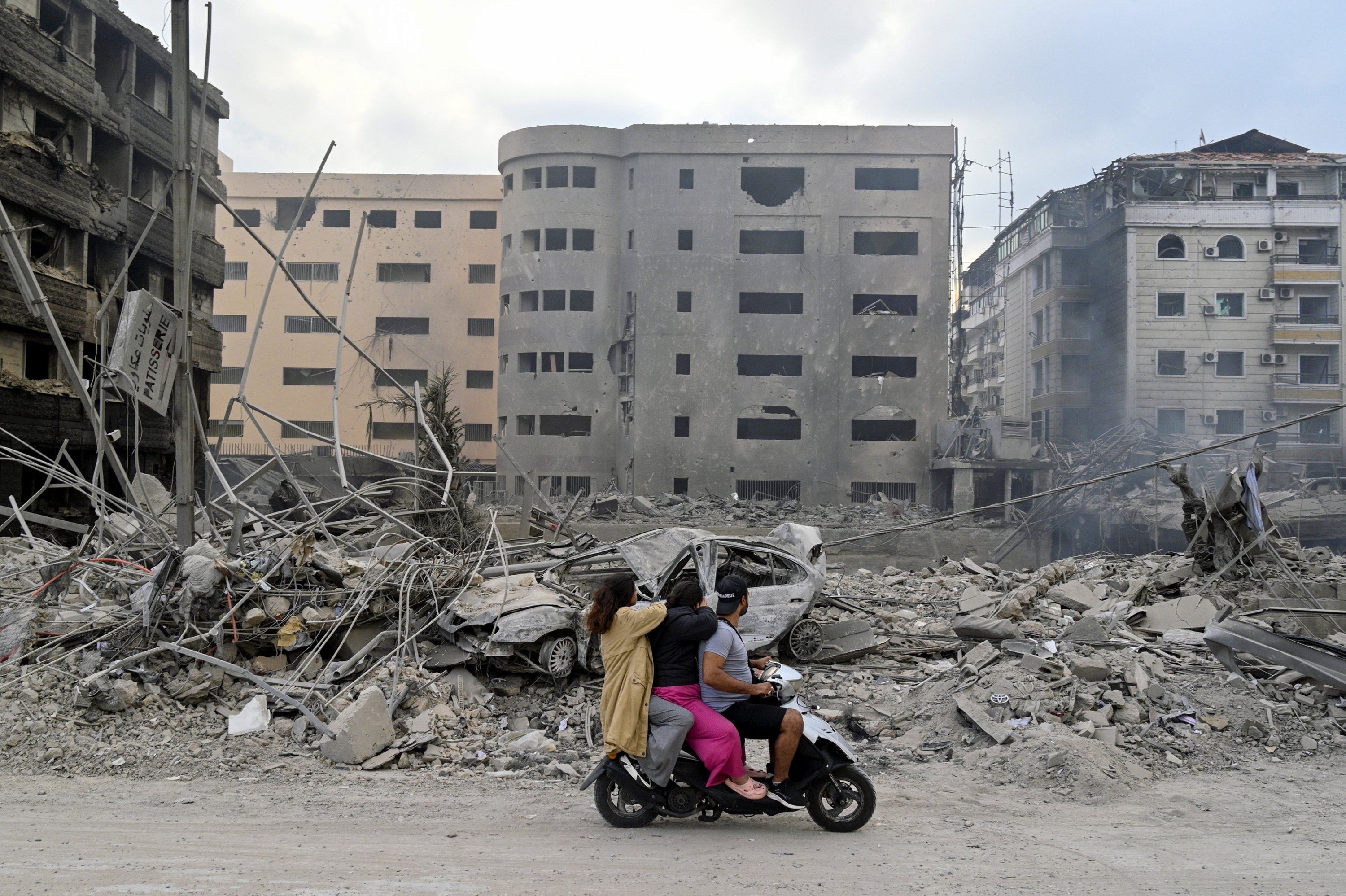© Turkuvaz Haberleşme ve Yayıncılık 2026
After a night of heavy Israeli bombardment in southern Beirut, Hezbollah retaliated by firing rockets at Israel's third-largest city Haifa early Monday.
Israeli forces, however, looked poised to expand ground incursions into southern Lebanon on the first anniversary of the Gaza war, which has spread conflict across the Middle East.
Iran-backed Hezbollah, an ally of Hamas, the Palestinian resistance group in Gaza, said it targeted a military base south of Haifa with "Fadi 1" missiles and launched another strike on Tiberias, 65 kilometers (40 miles) away.
Hezbollah said it targeted areas north of Haifa with missiles in a second assault later Monday.
In south Lebanon, 10 firefighters were killed in an Israeli airstrike on a municipal building in the town of Bint Jbeil, according to the country's Health Ministry. And an Israeli soldier was killed in border-area combat, the military said.
The spiraling conflict has raised concerns that the United States, Israel's superpower ally and Iran will be sucked into a wider war in the oil-producing Middle East.
Iran launched a barrage of missiles at Israel on Oct. 1. Israel has said it will retaliate and is weighing its options. One possible target is Iran's oil facilities.
Israeli police confirmed that rockets had struck Haifa, also a major Mediterranean port, on Monday and local media said 10 people were hurt.
An Israeli military statement said five rockets were launched at Haifa from Lebanon and interceptors were fired at them. "Fallen projectiles were identified in the area. The incident is under review."
It said 15 other rockets were fired inland at Tiberias in Israel's northern Galilee region, some of which were shot down. Israel media said a further five rockets hit the Tiberias area.
Israel also intercepted two drones launched early Monday from the east after sirens blared in the central areas of Rishon Lezion and Palmachim, the military said.
Hamas, which triggered the Gaza war with a surprise incursion on Israel a year ago, meanwhile targeted Israel's commercial capital Tel Aviv with a missile salvo, the group said, setting off sirens in central areas of the country.
Many Israelis have regained confidence in their long-vaunted military and intelligence apparatus after a series of deadly blows to the command structure of Hezbollah, Iran's most formidable Middle East proxy force, in Lebanon in recent weeks.
Beirut's densely populated southern suburbs were again pounded by airstrikes overnight as Israel extended an aerial campaign on the area where Hezbollah has its headquarters.
Israel accuses the Shiite movement of deliberately embedding its command centers and weaponry beneath residential buildings in the heart of Beirut. Hezbollah denies storing weapons among civilians.
Israeli airstrikes have displaced 1.2 million people in Lebanon and as the bombing campaign intensifies, many are afraid their country will face the vast scale of destruction wrought on Gaza by Israel's air and ground onslaught.
"I never expected we were going to get here. Israel is done with Palestine, they now want to come here too?" said displaced Lebanese man Mohammed Kanso.
He said he had been sleeping in the street for 10 days after having been uprooted by Israeli military actions and did not have the cash to buy medicine for himself or his son.

Hezbollah began launching rockets at Israel on Oct. 8, 2023, in solidarity with Hamas. After a year of exchanges of fire between Hezbollah and Israel mostly limited to the frontier region, the conflict has significantly escalated in Lebanon.
Israel has carried out a ground invasion into Lebanon's south, which Hezbollah says it has repelled.
The Hamas incursion unleashed an Israeli genocidal war on Gaza that has largely flattened the densely populated enclave and killed almost 42,000 people, Palestinian health authorities say.
The Gaza war has given rise to a multi-front Middle East conflict, drawing in Iran's broader "Axis of Resistance" – Hezbollah, Yemen's Houthis, Iraqi militia groups – and sparking several rare, direct confrontations between Israel and Iran.
Another heavy air attack on Beirut is reported to have targeted Hashem Safieddine, who was widely seen as the heir apparent of Hezbollah leader Hassan Nasrallah who was killed by a bunker-busting attack on a Hezbollah command lair on Sept. 27.
Safieddine has not been heard from since Thursday.
